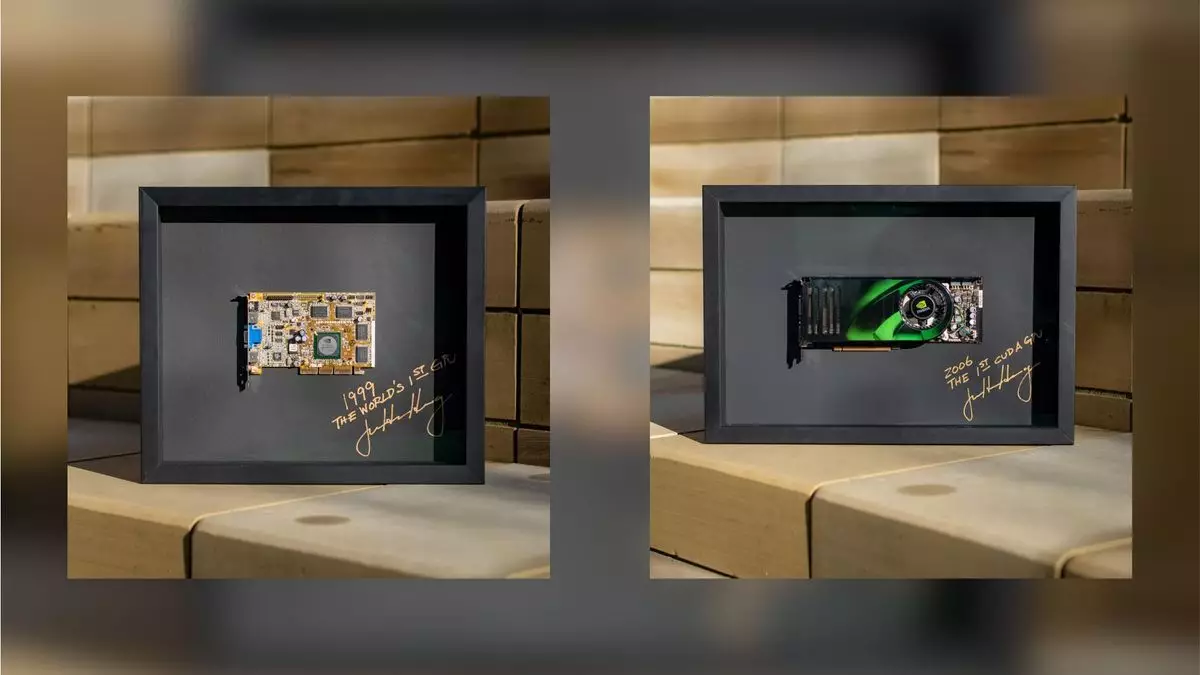Nvidia’s presence at the Consumer Electronics Show (CES) has always been significant, and this year is no different. With the backdrop of one of the most esteemed technology conferences, Nvidia seeks to leverage its rich history in the gaming sector to captivate audiences and reignite interest in its groundbreaking technology. This strategy is pivotal as the company prepares to unveil its next generation of graphics cards—a key development for the gaming community and technology enthusiasts alike.
On January 1, just days before the CES event, Nvidia hinted at a nostalgic yet strategic giveaway featuring five classic graphics cards from its history, beginning with the legendary GeForce 256. Dubbed the “world’s first GPU,” the GeForce 256 was rolled out on October 11, 1999, and represented a monumental leap in graphical processing capabilities at the time. Manufactured using a 220 nm CMOS process by TSMC, Nvidia’s long-time manufacturing partner, this card not only transformed gaming but also set the groundwork for graphics technology as we know it today.
As Nvidia prepares to honor this legacy, it does so with a hint of competitive bravado, showcasing its historical achievements to remind audiences of its long-standing dominance in the field. The competition for nostalgia continues with the GeForce 8800 Ultra, the first graphics card to incorporate CUDA technology. This not only solidified Nvidia’s reputation for high performance in gaming but also made significant inroads into professional realms like graphics design and video editing.
Nvidia’s choice to utilize social media as a central component of its marketing strategy marks a notable shift in how technology companies engage their audience. With the hashtag “#GeForceGreats,” users are encouraged to comment for a chance to win these classic cards, integrating customer participation into the event narrative. This approach builds a sense of community and excitement around the upcoming CES presentation and aligns with broader trends where brands actively seek consumer involvement to bolster enthusiasm.
Furthermore, this campaign is not happening in isolation. The Nvidia Twitch account has seen relentless activity, featuring continuous live streams and announcements of enticing mystery boxes available for followers. This creates an inclusive experience for fans and expands the reach of Nvidia’s promotional tactics. The presence of a “total hype to date” bar sets a tangible metric for engagement, encouraging viewers to be part of this growing digital event.
While the nostalgic gesture of honoring past achievements with vintage card giveaways is compelling, there’s also a keen focus on innovation as Nvidia prepares to unveil its next-generation RTX 50 series graphics cards. Industry insiders speculate that models like the RTX 5080 and RTX 5090 will be on the agenda, indicative of Nvidia’s commitment to maintaining its competitive edge in a rapidly evolving market. The advancement from Ada Lovelace architecture, exemplified by the RTX 40 series, to what’s next promises significant performance improvements and groundbreaking features.
The forthcoming CES presentation is likely to be significant not just in terms of showcasing hardware but in setting the stage for Nvidia’s future trajectories. The duality of honoring the past while forging ahead into innovative technologies echoes a sentiment that many brands strive for today—acknowledging their roots while keeping their eyes firmly set on the horizon.
Nvidia’s efforts leading up to CES reveal a multifaceted strategy that honors its legacy while also ambitiously pushing toward future advancements. By engaging the audience through nostalgic celebrations and effective social media campaigns, Nvidia not only strengthens its brand loyalty but also reinforces its position as a preeminent player in the graphics card market. As the CES presentation looms, all eyes will be on Nvidia, not only to celebrate its storied past but to witness the next chapter in its illustrious history of innovation.


Leave a Reply